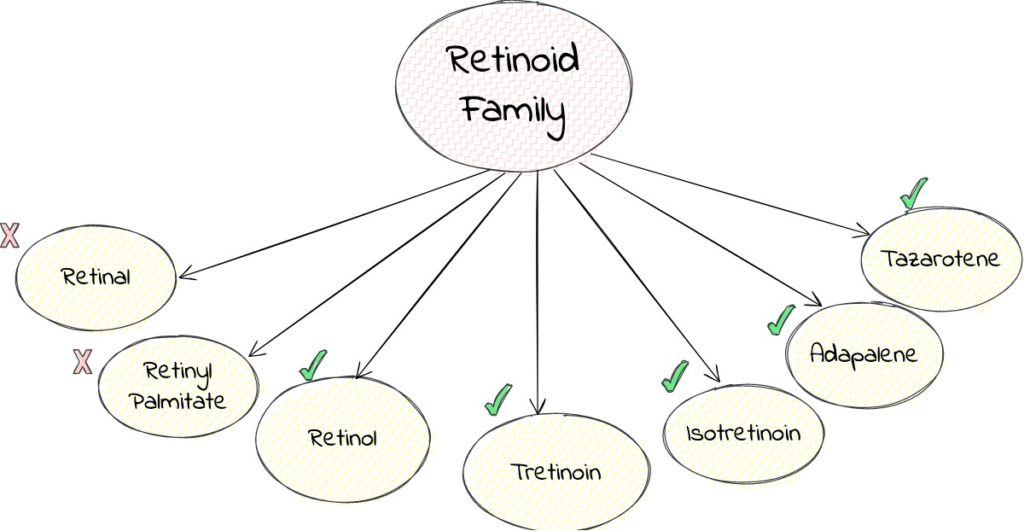Retinol serums for skin are synthetically made vitamin A and even topical application of Retinol has been associated with an increased risk of birth defects in fetus if used while in pregnancy or breastfeeding. So, the answer is No, Retinol cannot be used in breastfeeding.

What is Retinol?
Retinol is a fat-soluble derivative of Vitamin A (God for skin) that gets converted by skin enzymes into Retinoic acid. Retinol is often confused with Retinoid (also a derivative of vitamin A) but Retinol has a lower percentage of Retinoic acid (that’s why Mild/Less potent) than Retinoid hence Retinol is easily available over the counter, while Retinoid needs a prescription. Because their percentage of Retinoic acid is lower, Retinol also works slowly, yet is very effective for numerous skin concerns.
What does Retinol do for our skin?
- It boosts the Collagen production of the skin by speeding the skin cell turnover rate to double.
- Treats acne and acne lesions.
- Works wonders for treating skin concerns like fine lines, wrinkles, sagging skin, and hyperpigmentation.
- Retinol goes deep into the layer of the skin and exfoliates the clogged pores from within cleaning all the dead skin cells, sebum, and bacterial growth.
How does Retinol work on your skin?
- When we start to age, our cells don’t regenerate as quickly as they did when we were young.
- Retinol directly affects gene expression, regulating all our age-related issues by eliminating dead skin cells and allowing fresh, new cells to come up to the surface.
- It goes deep into the layers of the skin and exfoliates it from within. It also clears up acne by cleaning up the pores and eliminating bacterial growth.
Explain Retinol in detail
Retinoid- It is basically an umbrella name for all the vitamin A ingredients you can find in the market therefore, Retinoid is the head of the family with 7 kids.

- Retinol (the most popular child, available over the counter)-0.1% – 1.0%
- Retinyl palmitate (it’s almost pointless so don’t even bother)- 1%
- Retinal (not easy to find in products because of serious stability issues but an alternative to retinol if you’re looking for something with more efficacy)-0.1%-1.0%
- Retinoic Acid or Retin-A (Gold standard retinoid, very commonly prescribed as Tretinoin by doctors for treating acne and aging skin issues. 20 times more powerful than Retinol. Only available by prescription)-0.01-0.1%
- Adapalene (Can get over the Counter. Solid effective in treating acne)-0.1%
- Tazarotene (Used for treating severe acne, hyperpigmentation and acne scars. It’s one of the prescription retinoids)-0.1%
- Isotretinoin (Oral retinoid. It’s used to treat severe cystic acne. Again, one of the prescription retinoids)
Stay away from all of these kinds of Retinoids if you are breastfeeding!
Why should you stay away from Retinol while breastfeeding and pregnancy?
As amazing as the topical retinol transformative effects are on the skin. Retinol and all forms of topical retinoids are known to cause serious birth defects in pregnancy. Esp. Isotretinoin, an oral retinoid can cause congenital disabilities. More research is needed to know how much topical retinol is absorbed in the bloodstream; we know it can even cause miscarriages and impact the development of the embryo.

Applying Retinol while breastfeeding
To use Retinol while breastfeeding is a serious careless decision. However, this is unsure how much retinol is passed through the skin to breast milk from the topical application but it’s simply not worth the risk as vitamin A can be toxic for the infant and most physicians will not recommend retinol while breastfeeding.
When should you stop using Retinol?
In my opinion, stop using any kind of retinoid 1 month before you try to get pregnant for the utmost safety.
When can you resume topical Retinol again?
As soon as you are 100% done with nursing the baby, you can start with all your retinol products again. It might actually help you with any hormonally induced acne or pigmentation.
Is the consumption of Vitamin A in diet bad in pregnancy or nursing?
Are there any safe Retinol alternatives in breastfeeding and pregnancy?
YES! There are some really effective and safe skincare products for your skin during pregnancy or in general. Starting off with:
1. Bakuchiol- It is called “plant extract retinol” or “vegan retinol”. It is very safe for sensitive skin-type also. Bakuchiol is a new kid on the block whose properties are almost the same as retinol but it gently incorporates all the anti-aging benefits to the skin and helps with the skin’s firmness without any kind of harm to you or the baby. How is it safe- Bakuchiol is an antioxidant derived from the seeds and leaves of the Corylifolia plant.
2. Azelaic acid- Azelaic acid is an antioxidant naturally found in grains such as wheat, barley, and rye. It helps improve dark spots, brown skin discoloration and uneven skin tone. Its anti-inflammatory properties make it great for people with Rosacea. It is a safe ingredient prescribed as an alternative to use in pregnancy by Board Certified Dermatologists. Azelaic acid works wonders in treating acne by decreasing the production of excess Keratin in the skin, a natural substance that can lead to the development of acne and acne-causing bacteria. The excess Keratin can cause the dead skin cells to stick together making them harder to remove. The oils from the sebaceous glands can form a blockage in the hair follicle and that’s how acne begins. 10%-20% of Azelaic acid is well effective and tolerated.
3. Vitamin C – Vitamin C has antioxidants that fight off free radicals. It is one of the safest ingredients to use in pregnancy, nursing, or in general to repair sun damage and brighten your skin. It accelerates collagen production making the skin look plump and young. There are 6 variations of Vitamin C but L-Ascorbic acid is in the purest form and the best of all the forms of Vitamin C to perform the core functions, like brightening, boosting collagen, and photo-protecting the skin.
4. Niacinamide– It is a form of vitamin B3 which is another safe option in pregnancy for topical use and is one of the most popular ones too. Niacinamide builds a protein called Keratin which helps to smooth skin and gives a youthful glow to the skin. Niacinamide is also a very soothing ingredient, in general, to calm any sort of inflammation and it helps with hyperpigmentation as well. There has been no research proving any problems with this ingredient.
5. Glycolic Acid/Lactic Acid – Both Glycolic acid and Lactic acid are AHAs and are safe during pregnancy. Keep the concentration below 7%. They are great exfoliators and they speed the turnover rate of skin cells, getting rid of that dull and dry skin, making the skin bright and glowing.
6. Hyaluronic Acid – HA is the gentlest and most calming ingredient of all. Doesn’t clash with any other ingredient and is very safe during pregnancy or nursing. It even calms dry and irritated skin. A few drops of hyaluronic acid give your skin an instant plump dew and keep the skin hydrated and glowing for hours. Layer hyaluronic acid with a nice moisturizer and you’re set.
7. Peptides- Peptides are naturally occurring amino acids in our skin. They are the building blocks of certain proteins like collagen and elastin which are proven to be anti-aging. Peptide serums or moisturizers help improve skin elasticity evidently and gives a youthful appearance to the skin.
8. Kojic Acid – Kojic acid is a natural skin-lightening ingredient derived from a species of fungi. It reduces melanin production and treats melasma, photo-aging, acne lesions, and pigmentation issues. It can make skin sensitive to UV rays so wear sunblock when stepping outside.
9. Mineral/Physical Sunscreen – They contain zinc oxide or titanium dioxide which are completely safe for pregnant women. Mineral Sunscreens don’t absorb UVB radiation but rather form a physical barrier against them with the mineral ingredients zinc oxide and titanium dioxide. Mineral sunscreens are a must in your skincare routine.
What other skincare ingredients to avoid in pregnancy and breastfeeding?
- All Retinoids
- Salicylic acid
- Vitamin A
- Benzoyl peroxide
- Hydroquinone
- Essential oils
- Parabens
- Chemical Sunscreens
- Aluminum Chloride
- Formaldehyde
- Phthalates
- Alpha Arbutin
- Tranexamic acid
- Diethanolamine
- Spironolactone
- Tetracycline
- Bisphenol
- Toluene
- Chemical peels
- Fragranced cosmetics
- Botox or fillers
- Dihydroxyacetone
Ladies, check the ingredients carefully of all the cosmetic products you are buying during pregnancy for the sake of your unborn child.
Have a healthy baby & great skin. Love~ Beauty Stroll
References
https://en.wikipedia.org/wiki/Retinol
You may also like these articles
Ivory skin tone- what is it and how to take care of it?
Retinol Ruined my skin! – How to UNDO?
Glutathione injections- the complete guide
Doja cat weight loss journey you don’t wanna miss!
Chrissy Met’z weight loss secrets are finally out